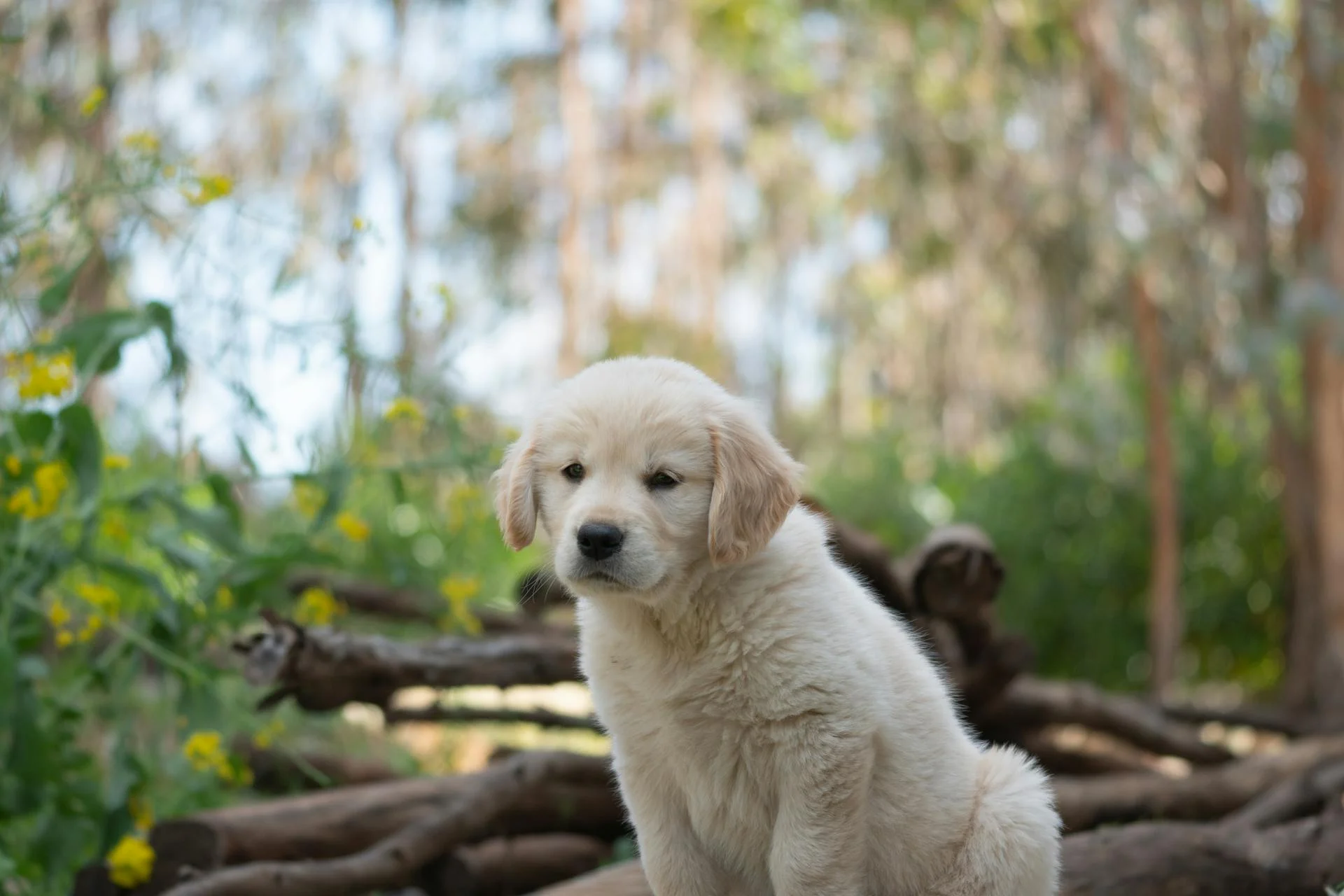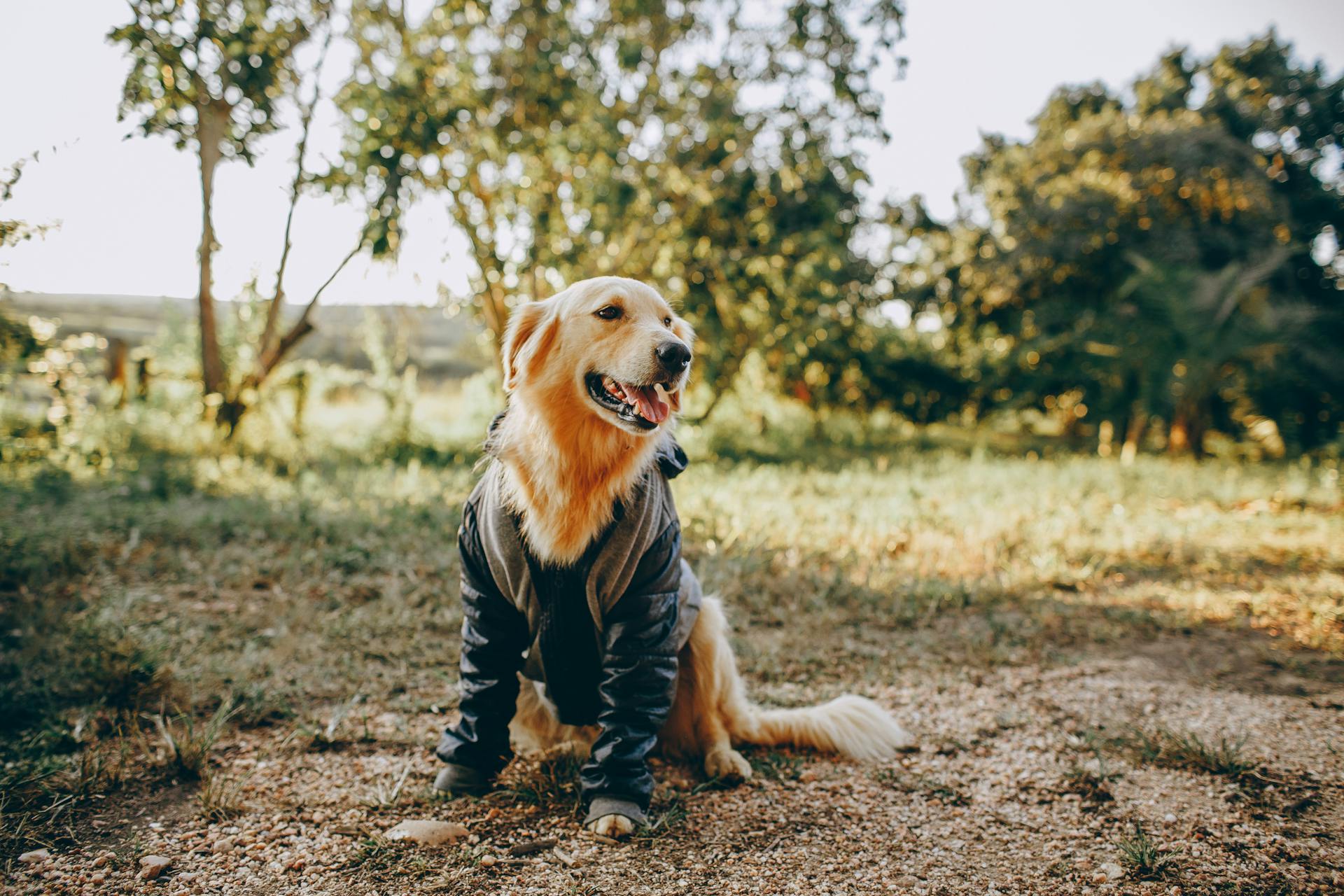
Resource guarding in Golden Retrievers can be a concerning behavior, but understanding the signs and causes can help you address it effectively.
Resource guarding is often triggered by a perceived threat to food, toys, or other valuable items, causing your Golden Retriever to become possessive and protective.
Some common signs of resource guarding in Golden Retrievers include growling, snapping, or showing teeth when approached while eating or playing with a valued item.
Growling is the most common warning sign, often accompanied by a stiffening of the body and a direct stare.
Golden Retrievers may also exhibit resource guarding due to anxiety, fear, or past experiences that have led them to associate certain items with safety or comfort.
In some cases, resource guarding can be a learned behavior, often passed down from their owners or other dogs in the household.
If you've noticed any of these signs in your Golden Retriever, it's essential to address the issue promptly to prevent it from escalating into more severe behaviors.
Consider reading: Golden Retriever Cancer Hemangiosarcoma
Understanding Resource Guarding
Resource guarding is a completely normal behavior in dogs, inherited from their wild ancestors as a mechanism for survival.
As a dog owner, it's essential to remember that your Golden Retriever is still a close cousin to the wolf, and they're wired to protect their resources.
Common triggers for resource guarding include the presence of other dogs or pets, approach of family members, especially children, sudden movements, or loud noises near the guarded resource.
To effectively manage your Golden Retriever's resource guarding, observe them closely and take note of which resources they guard and under what circumstances.
Here are some common triggers to watch out for:
- The presence of other dogs or pets
- Approach of family members, especially children
- Sudden movements or loud noises near the guarded resource
Teaching Your Retriever
Desensitization and counter-conditioning are powerful techniques to help your Golden Retriever overcome resource guarding. This involves gradually exposing your dog to the triggering situations, starting with low-intensity encounters and gradually increasing the intensity.
To start, stand a considerable distance away while your dog eats, and gradually decrease the distance over time, rewarding your dog with praise or treats when they remain calm. This process helps your dog associate your presence near their food with positive outcomes, reducing their need to guard the resource.
Teaching your Golden Retriever the "drop it" or "give" commands is also crucial in managing resource guarding. These commands instruct your dog to release an item from their mouth or willingly give it to you.
Here's a step-by-step guide to teaching the "drop it" command:
- Start by playing with a toy your dog likes but doesn’t typically guard.
- While your dog is holding the toy, say "drop it" or "give" and offer a high-value treat.
- When your dog releases the toy, praise them and give them the treat.
- Gradually progress to using the command with more valuable items.
The "trade-up" technique involves offering your Golden Retriever a higher-value item in exchange for the one they’re guarding. This method teaches your dog that surrendering a resource can lead to better rewards, reducing their need to guard.
To practice the "trade-up" technique, offer a high-value treat or a favorite toy whenever your dog is guarding a less valuable item. Over time, your dog will learn that giving up a guarded resource is a positive experience.
The "off" command is a useful one if your furry friend guards furniture like a couch or a bed. First, make sure your dog is on the couch, then say "off" and lure him to the floor with food.
Prevention and Prevention Techniques
Teaching your golden retriever basic commands like "sit" can help prevent resource guarding, and you can start training them as young as eight weeks old.
It's essential to be patient and not expect too much consistency from your puppy until they're at least six months old.
Start by teaching your dog to sit before getting an object they want, such as a bowl of food or a toy.
Managing your dog's environment is crucial until you see an improvement in the guarding behaviors.
Remove toys and food bowls from common areas and only bring them out in controlled circumstances.
Feed your dog away from other animals and people to avoid triggering resource guarding behavior.
Avoid situations that tend to bring out the resource guarding behavior in your dog if possible, and modify the situation as best you can for everyone's safety.
For more insights, see: 6 Month Old Puppy Resource Guarding
Online Training and Resources
If your Golden Retriever's resource guarding behavior is severe or doesn't improve with consistent training, consider consulting a professional dog trainer or behaviorist.
These experts can help identify the root cause of the issue and create a tailored training plan to address the problem effectively.
A reputable online training program, like SpiritDog's "Stop Resource Guarding" Course, can also be a valuable resource.
This course, attended by 243 students, consists of 42 comprehensive lessons that teach science-based, fear-free techniques to help your dog trust you around their treasures.
With lifetime access, step-by-step instructions, and a certificate upon completion, this course will transform your relationship with your dog and eliminate resource guarding behaviors.
In some cases, medical issues or anxiety may contribute to resource guarding, and a veterinarian or veterinary behaviorist can help diagnose and treat these underlying conditions.
Check this out: Golden Retriever Crate Training
Signs and Causes
Golden retrievers are prone to resource guarding, which can be a challenging problem for owners to address. Resource guarding is a common behavior in dogs, including Golden Retrievers.
Some signs of resource guarding in Golden Retrievers include growling or snapping, stiff body language, and possessiveness over food, toys, or other belongings. If your Golden Retriever growls or snaps when someone approaches them while they're eating or playing with a toy, they may be guarding their resources.
Here's an interesting read: Golden Retrievers Good Hiking Dogs
Stiff body language, including tense muscles, a stiff tail, and a frozen or rigid posture, can also indicate resource guarding. Dogs who are resource guarding may display these signs when someone approaches them while they're eating or playing with a valuable item.
Resource guarding can occur in any dog breed and can grow worse if it isn't addressed. A combination of factors can impact the dog, leading to resource guarding, including the nature of the dog, the environment it inhabits, and its background.
Here are some signs of resource guarding in dogs:
- Growling or snapping
- Stiff body language
- Possessiveness over food, toys, or other belongings
- Stiffening their body over an item
- A hard stare
- “Whale eye” (when dogs show the whites of their eyes)
- Lifting their lips
- Low growling
- Baring their teeth
These signs can indicate that your dog is uncomfortable when a human or animal approaches their valuable item. If you notice any of these signs, it's essential to address the behavior to prevent it from escalating.
Prevention and Handling
Teaching your golden retriever simple commands like "sit" can help prevent resource guarding. This command should be practiced consistently, especially when introducing new objects like food, toys, or treats.
Puppies can start learning basic commands around eight weeks old, but you shouldn't expect much consistency until they're at least six months old. Be patient and remember that consistency is key.
Removing toys and food bowls from common areas can help manage your dog's environment and prevent resource guarding. This means bringing them out only during controlled circumstances.
Feeding your golden retriever away from other animals and people can also help prevent resource guarding. This simple step can make a big difference in reducing guarding behaviors.
If you notice your dog starting to show signs of resource guarding, try to avoid situations that trigger the behavior. If it's impossible to avoid, modify the situation as best you can for everyone's safety.
Training your dog from a young age is one of the most effective ways to discourage resource guarding. Don't snatch things away from your puppy or adult dog, as this can create a competitive and challenging situation.
Teaching your dog to leave whatever they have in their mouth on command can also help prevent resource guarding. A simple "leave it" command can be effective if your dog has been trained well.
In some cases, distractions can work to get your dog to leave an object, but this method can end up reinforcing the behavior. Be cautious not to reward your dog for taking something and then leaving it.
If you notice extreme resource guarding in your golden retriever, it's best to seek intervention from an expert. Behavioural issues caused by resource guarding can be dangerous, so don't try to deal with it by yourself.
Puppy and General Information
Puppies may engage in resource guarding, which can be hard to distinguish from other energetic behavior. Early training is the best way to deal with the problem.
Teaching your dog early can deescalate the issue and prevent it from becoming worse as your dog gets older.
What's in Dogs?
Dogs can be very protective of their resources, which might include food, toys, or even a favorite human. Some dogs don't mind being disturbed while eating or playing, but others can get very upset.
Resource guarding in dogs is also known as "possessive aggression." From a dog's point of view, possession is nine-tenths of the law.
Readers also liked: German Shepherd Golden Retriever Dogs
Puppy
Puppies can be quite energetic, and it's not uncommon for them to engage in resource guarding, which means they become protective of their toys or food. Early training is key to preventing this behavior from becoming worse as they get older.
Puppies need to learn that their home and belongings are shared with their family, and it's essential to set this tone from the start. This means being consistent and clear about what's acceptable behavior.
Resource guarding can be hard to distinguish from other energetic puppy behavior, but if you notice your puppy becoming protective of its toys or food, it's likely resource guarding. This is a common issue that can be addressed with early training.
It's crucial to reinforce the idea that you own the things your puppy plays with, and this mindset should be encouraged during training. By doing so, you can prevent resource guarding from becoming a bigger problem.
Worth a look: How to Stop Resource Guarding in Puppies
Dogs: When to Ask for Help
If you suspect your golden retriever is developing resource guarding behavior, it's essential to take them to the vet first. A change in behavior or aggressive behavior may indicate an underlying medical issue.
Some dogs develop resource guarding after reaching adulthood, becoming unusually protective about their food, toys, and beds. This behavior can be problematic and even dangerous if left unchecked.
People who live in the household, especially children, must learn management skills to address resource guarding. Avoid engaging in punishment, as this may worsen the behavior.
Resource guarding can lead to biting, which is a serious issue. If such an event occurs, it's crucial to call in a behaviorist immediately to determine an outcome in an unbiased manner.
If babies or toddlers live in the home, it's especially important to seek professional help sooner rather than later to address resource guarding.
Sources
- https://iheartdogs.com/7-strategies-to-stop-your-golden-retrievers-resource-guarding/
- https://www.akc.org/expert-advice/training/resource-guarding-in-dogs/
- https://www.thefarmersdog.com/digest/what-to-do-about-resource-guarding/
- https://goldenmeadowsretrievers.com/resource-guarding-causes-prevention-modification/
- https://lifestyle.livemint.com/relationships/pets/pets-dog-resource-guarding-training-111705646773251.html
Featured Images: pexels.com


